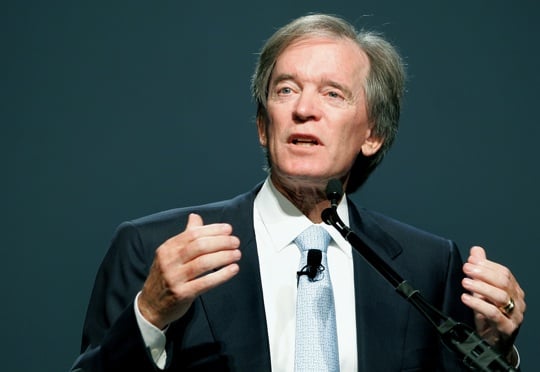'Sovereign balance sheets resemble an overweight diabetic on the verge of a heart attack,' Pimco manager says
Bill Gross, the manager of the world's biggest bond fund, said the global economy risks lapsing into recession with the pace of growth falling below the “new normal” level the firm has predicted since 2009.
“Sovereign balance sheets resemble an overweight diabetic on the verge of a heart attack,” Gross wrote in a monthly investment outlook posted on Newport Beach, California-based Pacific Investment Management Co.'s website today. “If global policy makers could focus on structural as opposed to cyclical financial solutions, new normal growth as opposed to recession might be possible. Long-term profits cannot ultimately grow unless they are partnered with near equal benefits for labor.”
Pimco outlined the new normal scenario at its annual Secular Forum in May 2009 that set investment guidelines for the firm for the next three to five years. The forecast predicted that following the market collapse in 2008 the U.S. economy would grow at a below-average pace for the next several years as growth in the developed markets slows, unemployment stays elevated and the “heavy hand of government” would be evident in the markets.
“Until recently, economic recovery has been relatively robust if one were a deployer of capital as opposed to the laborer who made that deployment possible,” Gross said. “Near zero percent interest rates have allowed profit margins to widen even in the face of anemic end demand. There are no double-digit investment returns anywhere in sight for owners of financial assets.”
Treasury Rally
After eliminating Treasuries from his $245 billion Total Return Fund in February because they were too expensive, Gross increased his holdings in U.S. government securities to 16 percent as the debt posted the highest quarterly returns in almost three years. Treasuries gained 6.4 percent in the third quarter as investors sought refuge amid slowing growth and Europe's sovereign-debt crisis, Bank of America Merrill Lynch indexes show.
The 30-year yield declined 15 basis points, or 0.15 percentage point, to 2.77 percent at 1:56 p.m. in New York, according to Bloomberg Bond Trader prices. Benchmark 10-year rates fell 13 basis points to 1.78 percent.
Bonds, stocks and real estate are all overvalued because of almost zero percent interest rates and a developed world growth rate closer to zero percent than the 3 percent to 4 percent historical averages, Gross added.
The Total Return Fund has returned 0.96 percent in the past year, beating 18 percent of its peers, according to data compiled by Bloomberg. Over the past five years, the fund has returned 7.8 percent on average, topping 97 percent of rival funds.
--Bloomberg News--







